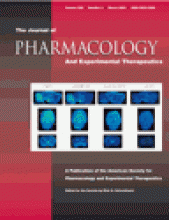Abstract
Anti-human immunodeficiency virus (HIV) drug penetration into the brain and cerebrospinal fluid (CSF) is necessary to tackle HIV within the CNS. This study examines movement of [3H]ritonavir across the guinea pig blood-brain and blood-CSF barriers and accumulation within the brain, CSF, and choroid plexus. Ritonavir is a protease inhibitor, used in combination therapy (often as a pharmacoenhancer) to treat HIV. Drug interactions at brain barrier efflux systems may influence the CNS penetration of anti-viral drugs, thus the influence of additional protease inhibitors, nucleoside reverse transcriptase inhibitors, and non-nucleoside reverse transcriptase inhibitors on [3H]ritonavir CNS distribution was explored. Additionally, the involvement of transporters on [3H]ritonavir passage across the brain barriers was assessed. Results from in situ brain perfusions and capillary depletion analysis demonstrated that [3H]ritonavir uptake into the guinea pig brain was considerable (6.6 ± 0.7 ml/100 g at 30 min, vascular space corrected), although a proportion of drug remained trapped in the cerebral capillaries and did not reach the brain parenchyma. CSF uptake was more limited (2.2 ± 0.4 ml/100 g at 30 min), but choroid plexus uptake was abundant (176.7 ± 46.3 ml/100 g at 30 min). [3H]Ritonavir brain and CSF uptake was unaffected by neither inhibitors of organic anion transport (probenecid and digoxin) or P-glycoprotein (progesterone), nor by any additional anti-HIV drugs, indicating that brain barrier efflux systems do not significantly limit brain or CSF [3H]ritonavir accumulation in this model. [3H]Ritonavir uptake into the perfused choroid plexus was significantly reduced by nevirapine and abacavir, additional perfusion studies, and isolated incubated choroid plexus experiments were carried out in an attempt to further characterize the transporter involved.
Footnotes
-
This study was funded by a Wellcome Trust Research Career Development Fellowship Grant (057254) awarded to S. A. Thomas, and a Wellcome Trust Vacation Scholarship awarded to R. N. Sanderson.
-
DOI: 10.1124/jpet.103.060210.
-
ABBREVIATIONS: HIV, human immunodeficiency virus; CNS, central nervous system; CSF, cerebrospinal fluid; P-gp, P-glycoprotein; MRP, multidrug resistance-associated protein; NNRTI, non-nucleoside reverse transcriptase inhibitor; NRTI, nucleoside reverse transcriptase inhibitor; 3TC, (–)-β-l-2′,3′ dideoxy-3′thiacytidine; AZT, 3′-azido 3′-deoxythymidine; d4T, 2′,3′ didehydro-3′-deoxythymidine; ddC, 2′,3′-dideoxycytidine; DMSO, dimethyl sulfoxide; Kin, unidirectional transfer constant; HPLC, high performance liquid chromatography; ANOVA, analysis of variance; OAT, organic anion transporter; Oatp, organic anion transporting polypeptide.
- Received September 17, 2003.
- Accepted November 14, 2003.
- The American Society for Pharmacology and Experimental Therapeutics
JPET articles become freely available 12 months after publication, and remain freely available for 5 years.Non-open access articles that fall outside this five year window are available only to institutional subscribers and current ASPET members, or through the article purchase feature at the bottom of the page.
|






